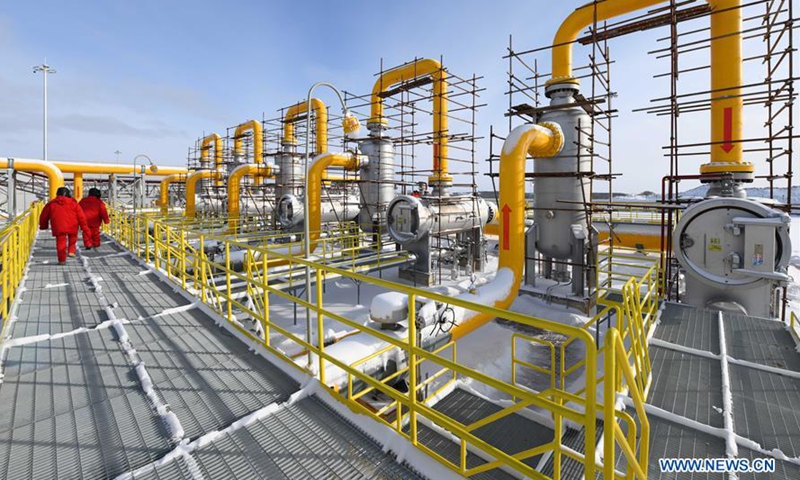Editor's note: CGTN's First Voice provides instant commentary on breaking stories. The daily column clarifies emerging issues and better defines the news agenda, offering a Chinese perspective on the latest global events.
The western powers continue to embark on unsuccessful strategies to harm Russia when in fact they hurt themselves more than their intended target. The hard-hitting economic sanctions that the United States, European Union and United Kingdom have imposed on Russia this year have delivered abysmal results and will continue to do so for the foreseeable future.
The next game plan is for G7 member states, which are the U.S., UK, Germany, France, Japan, Italy and Canada, to set price caps on Russian oil imports with a deadline set for December 5. Washington hopes to persuade most countries worldwide to join into a so-called buyer's cartel.
According to media reports, G7 nations would forbid financing and insuring Russian oil shipments unless the oil can be sold at a much lower price, well below current market rates. Crude oil pricing and futures contracts are normally settled daily on global trading floor exchanges such as in New York, London and elsewhere.
Nonetheless the West is betting that the Kremlin will accept the deal rather than burn out its excessive crude oil & gas supplies or sell it to different buyer.

Staff inspect gas-distributing and compressing station of China-Russia east-route natural gas pipeline at the first stop after the Russia-supplied natural gas enters in Heihe, northeast China's Heilongjiang Province, November 19, 2019. [Photo/Xinhua]
Russia unlikely to accept price caps
Price caps are only effective if the seller agrees to such conditions or the supplier feels desperation and urgency. Apparently, Russia is not in this position. Moscow, not Brussels, stands in a position of strength. The EU is confronting severe energy shortages while electricity prices are surging in European nations.
According to France 24, the one year futures' contract for German electricity hit 995 euros ($995) per megawatt hours while the French equivalent rose above 1,100 euros, which are more than tenfold increases in both countries compared to last year.
Electricity prices will keep going higher since Brussels and Washington are refusing to back down on sanctions against Moscow ever since Russian President Vladimir Putin announced the launching of 'Special Military Operations' in Ukraine on February 24.
In response, the U.S. has galvanized unified support from the UK, EU and other G7 members, believing that the punitive measures would cause the Russian economy's collapse.
Yet, Russia has enjoyed boom times with its Russian oil & gas exports and found more reliable buyers in the East, South Asian and even the Middle Eastern markets. India has emerged as Russia's top oil importer this year, purchasing one million barrels per day on average in recent months.
Europe won't see any relief
Brussels believes they got a winning hand by enforcing price caps, while the EU and U.S. sound as if it's a done deal already. But did they ask Russian President Putin if he will accept the deal?
By reviewing media reports, there's never any mention that the Western powers have communicated with the Kremlin about this policy. Western leaders have forgotten that the seller, which is Russia, reserves the right to say, "no."
There's also a common saying, "don't count your chickens before they are hatched," which means that one should not assume that your plans will come true just because you wish it to be so.
Brussels and Washington have also failed to recruit many non-G7 member states to join in. India could lose out on their current discount pricing for Russian oil should they bow to the Western powers' demands.
EU must stop with fantasy-thinking
The European economy is getting crushed by energy shortages, while Washington has exploited its weaknesses by exporting more U.S. oil & gas at very high prices. Hence, Europeans are confronting high inflation rates, severe supply chains' disruptions, water shortages and very gloomy business conditions.
To make matters worse, Estonia is calling for Brussels to support an 8th round of sanctions on Russia. Estonian Foreign Minister Urmas Reinsalu seeks to introduce new sanctions that would impact the energy, trade, and the SWIFT banking system. Such sanctions could severely curtail Russian oil & gas imports in Europe and potentially block them in full.
Moscow has no viable financial incentive to accept the G7's oil price caps under its current framework. Therefore, the U.S. and the EU should reconsider before they try another failed strategy.

 中文
中文



